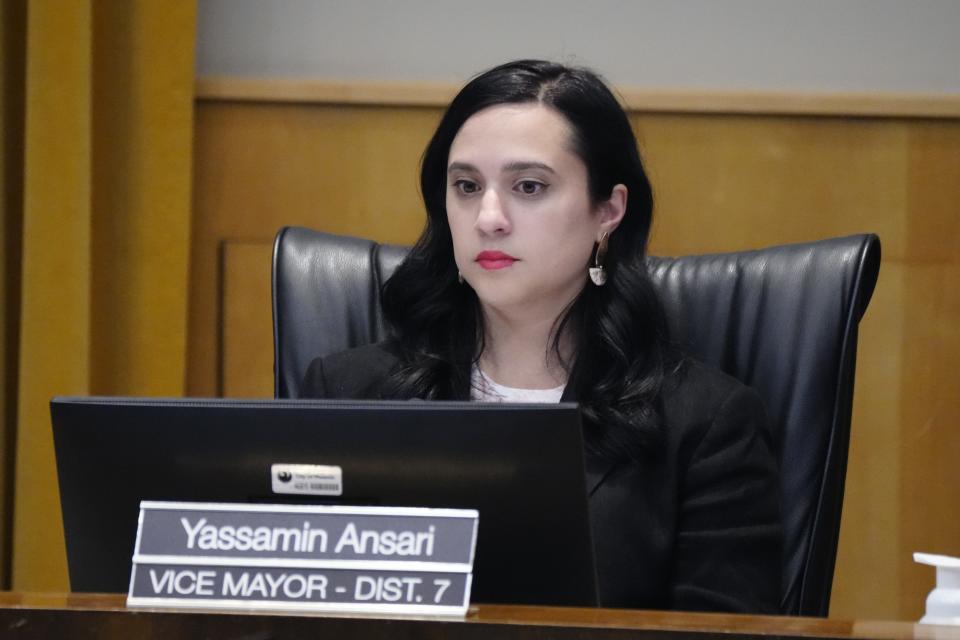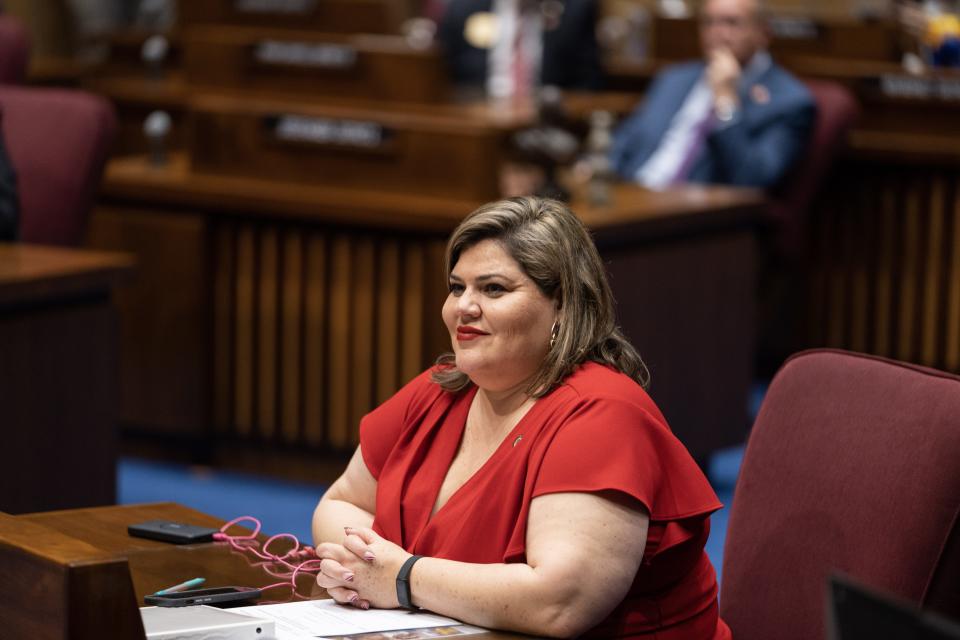Yassamin Ansari or Raquel Terán: Who will replace Rep. Ruben Gallego in Congress?
Corrections & Clarifications: An earlier version of this article gave incorrect information about Phoenix Vice Mayor Yassamin Ansari's endorsements in Arizona's 3rd Congressional District race.
Two front-runners have emerged in the race to replace Rep. Ruben Gallego in Arizona’s 3rd Congressional District: Phoenix Vice Mayor Yassamin Ansari and former state Sen. Raquel Terán.
Both self-described progressives, the two profess the same viewpoints on major campaign issues including supporting access to abortion, action to combat climate change, and Medicare for All.
Instead, the race is bringing to the fore their contrasting backgrounds, networks, and leadership styles. The 3rd district is a deep-blue stronghold that stretches through most of southern, western, and downtown Phoenix.
One, a graduate of Stanford and Cambridge universities, launched her public service career as a senior policy advisor at the United Nations, helping to craft the world-historic Paris Climate Agreement.
The other, the former chair of the Arizona Democratic Party, emerged as a leader in one of the biggest tidal waves of grassroots organizing and activism in recent Arizona history.
And, according to the candidates themselves, they would take different approaches to the job.
Ansari and Terán take the lead in race to succeed Ruben Gallego
With a district that leans Democratic by a 24-point margin, whoever wins the Aug. 6 Democratic primary is expected to breeze through the general election in November. If history is any guide, whoever wins the nomination could hold the seat for years or even decades to come.
So when Gallego announced he would vacate the seat to run for U.S. Senate, the field quickly became packed, with eight candidates announcing their intentions to run in the district.
Two of those candidates, Laura Pastor — a Phoenix City Council member and the daughter of the late Rep. Ed Pastor, D-Ariz., who represented the area for years before Gallego — and Ylenia Aguilar, a school board member and a formerly undocumented immigrant, soon suspended their campaigns, both citing health reasons.

Four other campaigns have struggled to get off the ground. Duane Wooten, a pediatrician, has raised less than a tenth of either leading candidate; Hector Jaramillo, a Glendale school board member, has reported zero funds raised; and two candidates, Trista di Genova and Allen Heatley, registered for the race but are not actively fundraising.
That leaves Terán and Ansari leading the field, both with substantial war chests, good name recognition within the district, and growing ranks of endorsements.
“The comparison and contrast is that Ansari comes from that global perspective, while Raquel has come more from the grassroots perspective,” said Mario Diaz, a government relations consultant and former staffer for the late Rep. Pastor.
“The question is, what do the voters in this district need, and what do they desire?”
Climate wunderkind vs. powerhouse community organizer
On one side of the race is Phoenix Vice Mayor Yassamin Ansari, a former U.N. policy staffer who in 2021 became the youngest woman ever elected to Phoenix City Council. Ansari beat out a crowded race for her seat with the backing of Phoenix Mayor Kate Gallego, impressing Arizona’s political ecosystem in the process.
“She announced this longshot bid for City Council, and distinguished herself as a hard worker, as someone who could connect with voters,” said Tony Cani, a veteran Arizona Democratic political strategist. “She ended up winning that race when a lot of people didn’t think that she would.”
Mayor Gallego has not endorsed anyone in the 3rd district primary.
Ansari's opponent, former state senator and Arizona Democratic Party Chair Raquel Terán, rose to prominence as a community organizer, mobilizing against Senate Bill 1070, the hardline “show me your papers” immigration bill that drew national protests when the Legislature passed it in 2010. Terán eventually helped lead the charge to recall the conservative lawmaker who had crafted the measure. She moved through the ranks of Arizona’s legislature and eventually became the chair of the statewide Democratic party in 2021.
“Raquel is somebody who has fierce loyalty among volunteers, activists, and other elected officials, from her years of work in the community and in politics,” Cani said. “She’s someone who does the work.”
Cani, who was the deputy director of President Joe Biden’s 2020 campaign in Arizona, described both candidates as “rising stars.” He noted that Terán was highly effective as a top surrogate for the Biden campaign.
“Our strategy was to empower these community leaders to go and talk to voters in ways that they knew worked, and Raquel really ran with that,” he said. “The story nationally was that Trump made gains among the Latino community, with the largest exception being in Arizona.”
Ansari “has a knack for earning media on issues that are important to her,” like climate change and homelessness, Cani said.
'Intelligently passionate' vs. 'analytical'
The candidates are also distinguished by their differing political styles. Diaz described Terán as “intelligently passionate,” and Ansari as more “analytical.”
“One will have their voice heard through deep thought, and another would have their voice heard through deep passion,” he said.
Asked about a member of Congress she looks up to, Terán named the former Rep. Ed Pastor, Arizona’s first Latino representative in Congress.
“Our voices had not been represented in Congress, and he got things done,” she said in an interview with The Arizona Republic. “He did bring a lot of resources into our district, from transportation to ensuring that working-class families had the necessary resources to move forward.”

As to whether Terán would join the House Progressive Caucus, which recently endorsed her? “In a heartbeat.”
Her competitor, Ansari, named Democratic Rep. Greg Casar, a freshman representative from Texas and outspoken member of the House Progressive Caucus who also got his political start as a city councilmember.
“He represents the generation of leadership that I’m from: we’re millennials, young, (from) diverse backgrounds,” she told The Republic. “He did a lot of work to advocate for labor, for raising wages, pass heat ordinances for city workers, and has been able to leverage that experience and be a really effective member of Congress.”
But Ansari said she was “not 100% sure” whether she would join the Progressive Caucus herself, saying she disagreed with their views on national security, and particularly some of their members’ opposition to U.S. military aid to Israel. “Israel is a critical ally to the U.S.,” she said, “so that relationship is very important to me.”
Terán and Ansari tend to agree more on policy than disagree
Asked about her biggest point of disagreement, Terán seemed to struggle to name any policy issue that sets her apart from Ansari. Instead, she said, the difference lies in her long experience and network in the district.
“I know the needs of the people in this district,” Terán said. “That experience puts me in a position of strength to represent our community.”
Asked the same question, Ansari cast herself as the more moderate candidate on policing and Israel.
Ansari said that she disagreed with Terán on “public safety,” suggesting that her opponent had supported items “not favorable” to police. The campaign later specified that the difference pertains to Terán’s comments in a 2022 television interview, when she declined to say when repeatedly asked if she supports the movement to defund the police.
Reached for comment, the Terán campaign again did not directly answer that question, saying that Terán does “not shy away from police accountability, nor improving all public safety resources” in the district.
However, Ansari herself said while running for city council in 2020 that she wanted to “demilitarize” the Phoenix police. A campaign press contact told The Republic that she no longer holds those views.
Ansari’s campaign also pointed to Terán’s 2022 vote against the “Back the Blue Act” as a point of disagreement on public safety. That bill would have created a benefit for the spouse or dependents of first responders killed in the line of duty, paid for by a surcharge on civil and criminal penalties. None of the Senate’s Democratic delegation voted for the measure, including Terán.
"While then Senator Terán supported increasing the death benefit for first responders, the bills included concerning elements that had vocal opposition from first responders," a campaign spokesperson wrote in a statement to the Republic.
As a final point of disagreement, Ansari criticized Terán’s 2022 vote against an Arizona Senate bill that would have had local law enforcement collect information on criminal offenses motivated by anti-Semitism, calling her vote “concerning.”
In response, Terán noted that her vote aligned with a majority of Democratic state senators and the ACLU, who argued at the time that the bill’s definition of anti-Semitism could infringe upon what they felt was legitimate criticism of Israel.
Coalitions take shape on behalf of the leading contenders
Terán’s deep community network appears to be reflected in the dollars and cents of her campaign. Between July and September, about 25% of total contributions to the Terán campaign were small-dollar donations of less than $200, according to campaign filings. For the Ansari campaign, that figure is only 5%.
Terán’s endorsements also point to grassroots support, being chosen by the advocacy group LUCHA and the left-wing Working Families Party. She is also backed by Sen. Mark Kelly, D-Ariz., and the labor union United Food and Commercial Workers 99, a group whose ground support could be crucial to the race, Diaz told the Republic.
Many see Terán as a continuation of the district’s decades-long legacy of electing Latino candidates: previously Ed Pastor, and then incumbent Rep. Ruben Gallego. A spokesperson for Gallego said that he is not planning to endorse anyone in the primary.
“Some in the Latino leadership community desire for a person of Latino descent to represent the district, to continue the legacy,” Diaz said. Still, “there are other Latinos who are really impressed with Ansari’s global vision.”
The Ansari campaign has received some endorsements as well, including from several Arizona state senators, and the International Association of Fire Fighters union. But a key strength of the campaign is fundraising, with almost twice as much cash on hand than the Terán campaign at the end of September.
While certainly helpful in the election, it’s unclear how far that will go, Diaz said.
“At the end of the day,” he said, “you can have all the money that you want in this district, but there’s only so many voters that one can touch with money.”
“This is all going to be about whose message can resonate with Mr. and Mrs. Sanchez, in their living room, to say ‘Believe in me: I will fight for you.’”
This article originally appeared on Arizona Republic: Two 'rising stars' want to succeed Ruben Gallego. What sets them apart
